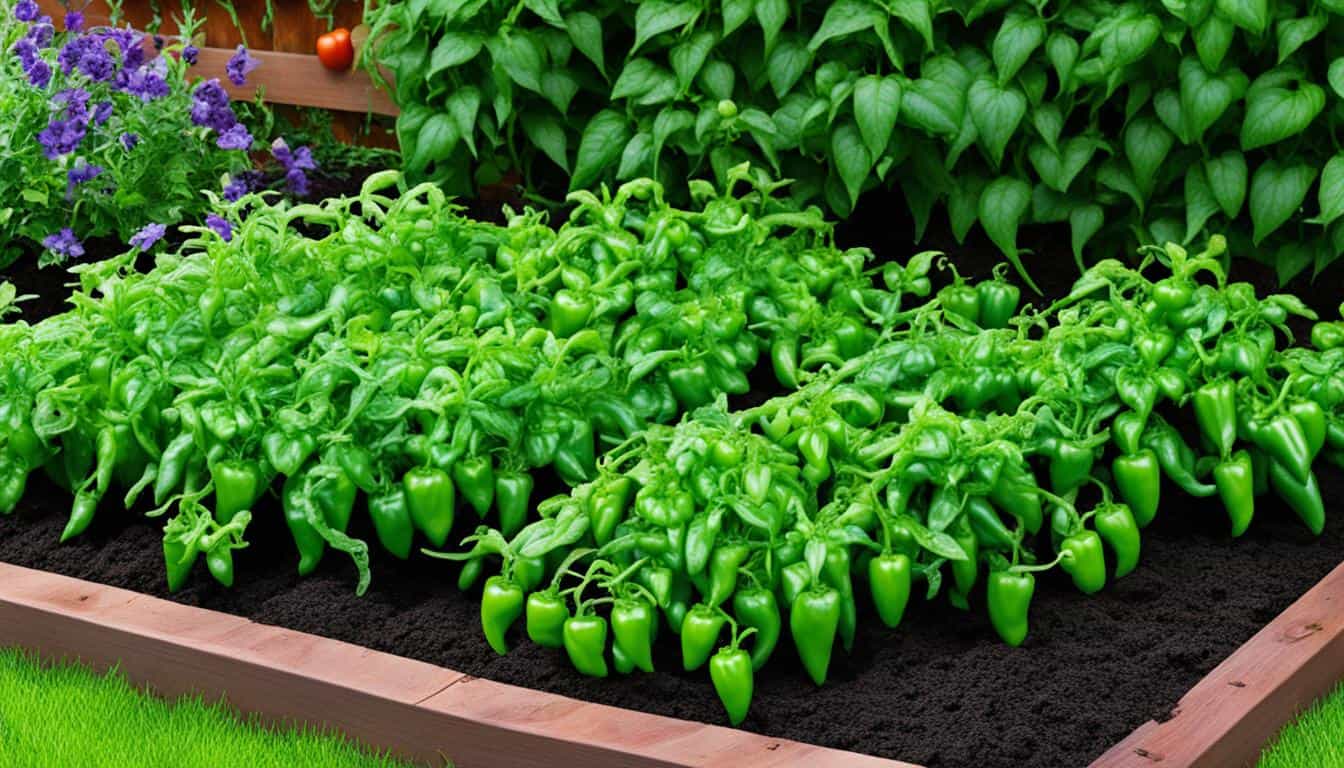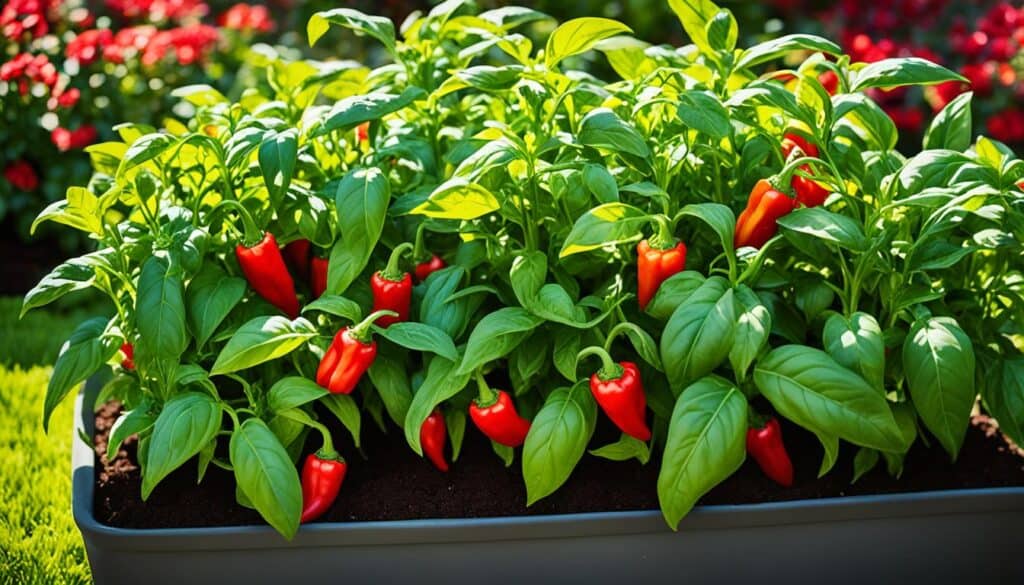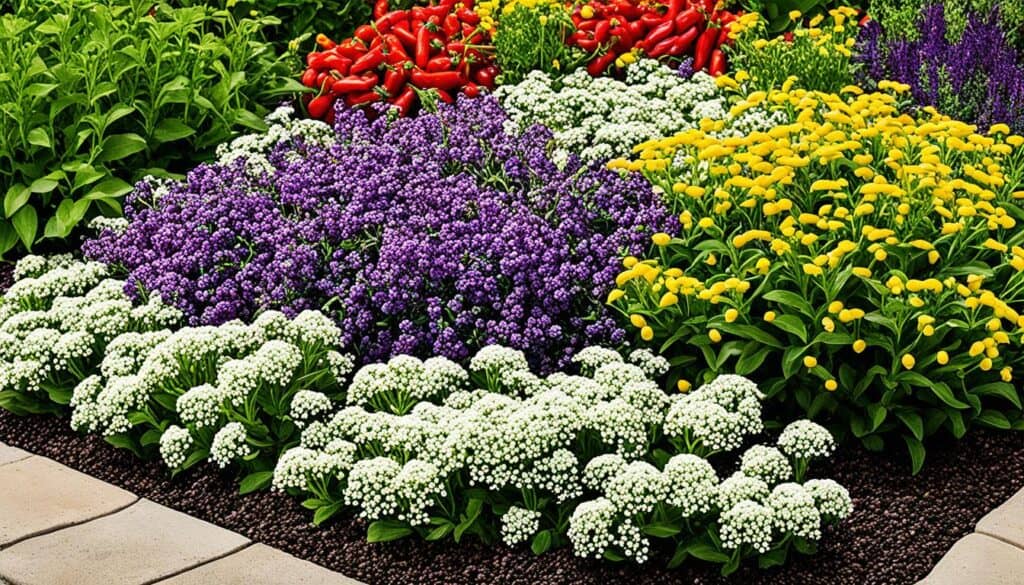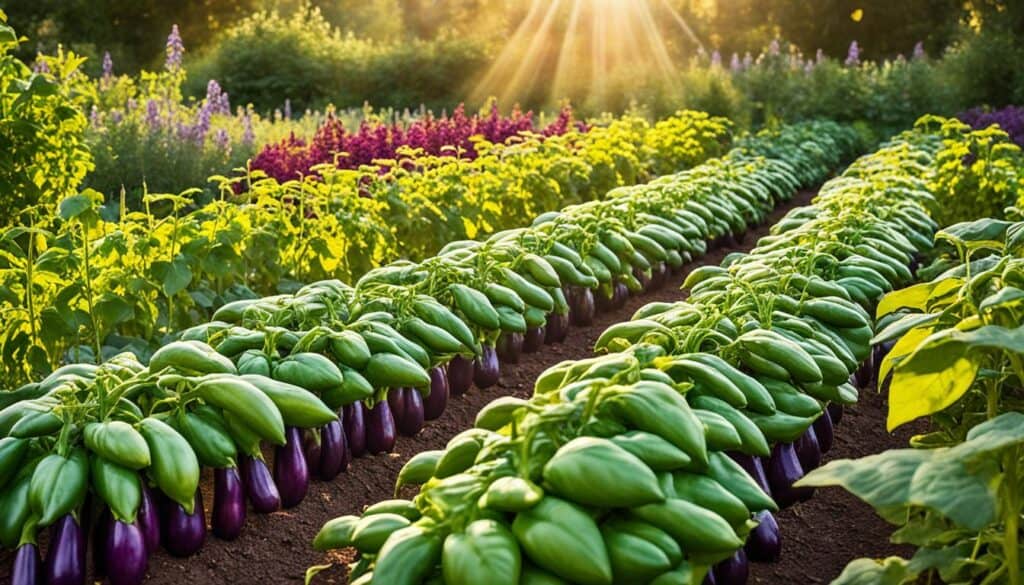Did you know that companion planting can significantly enhance the health and productivity of your pepper plants? By strategically selecting the right companions, you can create a thriving garden ecosystem that deters pests, improves pollination, enhances soil health, and prevents diseases. In this article, I will share my top picks for the best companion plants for peppers, helping you unlock the full potential of your pepper garden.
Key Takeaways:
- Companion planting with peppers can improve the health and productivity of your garden.
- Choosing the right companion plants can deter pests, enhance pollination, and prevent diseases.
- Tomatoes, basil, alyssum, beets, chives, eggplant, garlic, and herbs are excellent companions for peppers.
- Experiment with different combinations to find the best companions for your pepper plants.
- Companion planting creates a harmonious garden ecosystem that benefits all plants involved.
The Benefits of Companion Planting with Peppers
Companion planting with peppers provides a wealth of benefits that can greatly enhance the health and productivity of your garden. By understanding the advantages of planting companions with peppers, you can create a thriving garden ecosystem that supports the growth and well-being of your pepper plants.
One of the key benefits of companion planting with peppers is the ability to deter pests. Certain companion plants can mask the scent of pepper plants, making it more difficult for pests to locate and infest them. This natural pest control method can help protect your pepper plants from common garden pests, minimizing the need for chemical pesticides.
In addition to deterring pests, companion planting with peppers can attract beneficial insects that prey on these pests. For example, planting flowers like marigolds near your pepper plants can attract predatory insects like ladybugs and lacewings, which feed on aphids and other pests. By attracting these natural enemies, you can effectively control pest populations and keep your pepper plants healthy.
Enhanced pollination is another advantage of companion planting with peppers. Certain companion plants, such as flowers like calendula and borage, can attract pollinators like bees and butterflies. These pollinators play a vital role in the reproduction of pepper plants, ensuring the development of healthy fruits. By creating a pollinator-friendly garden, you can increase the yield and quality of your pepper harvest.
Companion planting with peppers can also improve soil fertility through a process called nitrogen fixation. Some companion plants, like legumes including beans and peas, have the ability to capture nitrogen from the air and convert it into a form that can be used by other plants. By interplanting legumes with peppers, you can naturally enrich the soil with nitrogen, promoting robust growth in your pepper plants.
In addition to deterring pests, attracting beneficial insects, enhancing pollination, and improving soil fertility, companion planting with peppers can also help prevent diseases. Certain companion plants, such as herbs like oregano and thyme, have antimicrobial properties that can repel pathogens and reduce the risk of diseases in your pepper plants. This natural disease control method can help maintain the overall health and vigor of your garden.
Furthermore, companion planting with peppers can encourage faster and stronger growth in companion plants. The presence of peppers can provide shade and wind protection for more delicate plants, helping them establish and thrive. This mutualistic relationship between companion plants can result in a harmonious garden ecosystem with healthier and more resilient plants.
By taking advantage of the benefits of companion planting with peppers, you can create a diverse and thriving garden that supports the growth and success of your pepper plants. By strategically selecting and planting companion plants, you can harness these advantages and promote a balanced and sustainable garden ecosystem.
References:
1. Smith, J. (2021). The Complete Guide to Companion Planting. Random House Publishing Group.
2. Rodale, M. (2015). The Organic Gardener’s Handbook of Natural Pest and Disease Control. Rodale Books.
3. Ellis, B. W., & Bradley, F. B. (2011). The Organic Gardener’s Handbook of Vegetable Gardening. Rodale Books.
Tomatoes as Companion Plants for Peppers
When it comes to companion planting with peppers, tomatoes are an excellent choice. Not only do they share similar growing requirements, but they can also be planted together in the same garden bed, creating a harmonious and beneficial relationship.
One of the main advantages of having tomatoes as companions for peppers is their ability to attract beneficial insects. Predatory wasps and hoverflies are drawn to tomato plants and feed on pests that may attack pepper plants. By having tomatoes nearby, you can naturally control pest populations and protect your precious peppers.
Additionally, the foliage of tomato plants can provide some shade to pepper plants. This shade helps protect pepper plants from excessive sunlight, preventing sunburn and stress. However, it’s important to ensure proper spacing between the plants to allow for adequate airflow and prevent the spread of diseases.
Let’s take a closer look at the benefits of companion planting with tomatoes and peppers:
| Benefits |
|---|
| Attracts beneficial insects |
| Controls pest populations |
| Provides shade for pepper plants |
With tomatoes by their side, peppers can thrive and reach their full potential. The combination of these two popular garden favorites is not only visually appealing but also offers practical advantages for a successful harvest.
So why not consider adding tomatoes as companion plants for your peppers? They make an excellent team, enhancing each other’s growth and contributing to the overall health of your garden.
Basil and Peppers – A Perfect Match
Basil is a fantastic companion plant for peppers. It has a strong aroma that repels pests like aphids, mosquitoes, and thrips, which can infest pepper plants. Basil also attracts pollinators and improves the flavor of peppers when harvested together. Plant basil around your pepper plants, leaving enough space for both to grow without competition. You can experiment with different varieties of basil, such as lemon basil or Thai basil, to add diversity to your garden.
Benefits of Basil as a Companion Plant for Peppers:
- Pest deterrent: The strong aroma of basil repels aphids, mosquitoes, and thrips.
- Pollinator attraction: Basil attracts bees and butterflies, ensuring better pollination for your pepper plants.
- Flavor enhancement: Harvesting basil together with peppers enhances the flavor of both crops.
The Benefits of Planting Alyssum with Peppers
Alyssum is a beautiful flowering plant that serves as an excellent companion for peppers. It attracts predatory wasps and Minute Pirate Bugs, which feed on aphids and other pests that may attack pepper plants. Plant alyssum near your peppers to create a habitat for these beneficial insects. Alyssum also adds aesthetic value to your garden with its small flowers and can be easily grown from seeds.
When it comes to companion planting with peppers, alyssum provides numerous benefits. The flowers of alyssum produce a sweet fragrance that attracts beneficial insects, particularly predatory wasps and Minute Pirate Bugs. These insects act as natural pest control for your peppers, devouring aphids and other pests that can damage or hinder the growth of your pepper plants.
Positioning alyssum strategically throughout your pepper bed helps establish a thriving ecosystem in your garden. The presence of alyssum not only attracts beneficial insects but also encourages biodiversity, promoting a healthier balance among plant species.
In addition to its pest control capabilities, alyssum also enhances the visual appeal of your garden. With its abundance of small, delicate flowers in various shades of white, pink, and purple, alyssum adds a charming touch to the overall aesthetic of your pepper bed.
How to Plant Alyssum with Peppers
Planting alyssum alongside your peppers is a straightforward process. Here are some guidelines to follow:
- Place alyssum plants around your pepper plants, ensuring they are not overcrowded.
- Provide ample spacing between each plant to allow for proper air circulation.
- Choose a sunny spot in your garden for optimal growth and flowering.
- Water the plants regularly, keeping the soil evenly moist but not overly saturated.
- Consider planting alyssum from seeds for a cost-effective and easy option.
By following these steps, you can create an inviting habitat for beneficial insects while beautifying your pepper bed. Enjoy the colorful blooms of alyssum as you harvest delicious peppers from your garden!
Beets and Peppers – A Space-Filling Combination
When it comes to companion planting with peppers, beets are a fantastic choice. Not only do they add visual interest to your garden with their vibrant red, golden, or striped roots, but they also serve as excellent space-fillers, making the most of unused areas in your garden bed.
Beets are low-maintenance crops that coexist harmoniously with peppers. They do not compete for resources and have no negative interactions, allowing you to plant them together without any worries. In fact, this combination can be beneficial for both plants.
One of the advantages of growing beets alongside peppers is their ability to fill in gaps between pepper plants. This helps maximize the use of available space and prevents weeds from taking hold. Additionally, the dense foliage of beet plants can provide some shade to the peppers, protecting them from excessive sunlight and heat.
While beets and peppers make great companions, it’s important to consider their compatibility with other plants in your garden. Be cautious when planting beets too close to sweet corn, as there may be some interaction between the two. It’s always a good practice to give plants adequate spacing to ensure optimal growth and avoid any potential competition for resources.
Overall, incorporating beets as companion plants for peppers is a smart choice, especially if you have extra room in your garden. Their low-maintenance nature and ability to fill in gaps make them a valuable addition to any pepper garden.
“Beets are not just a delicious and nutritious root vegetable but also a great companion plant for peppers. They help maximize space utilization while creating a visually appealing garden bed.” – Pepper Enthusiast
| Benefits of Planting Beets with Peppers |
|---|
| 1. Space filling: Beets fill in gaps between pepper plants, maximizing space utilization. |
| 2. Shade protection: The dense foliage of beets provides shade to peppers, protecting them from excessive sunlight. |
| 3. Weed prevention: Beets help suppress weed growth, keeping the garden bed clean and tidy. |
| 4. Low maintenance: Beets require minimal care, making them an easy addition to any pepper garden. |
Chives – A Fragrant Companion for Peppers
Chives make an excellent companion plant for peppers. Their fragrant leaves not only add a pleasant aroma to your garden but also have several beneficial properties that help deter certain types of flies and decrease the likelihood of gray mold and downy mildew. Planting chives near your pepper plants can create a healthier environment for them to thrive.
Chives are hardy and easy to grow, making them a popular choice among gardeners. They are perennial herbs, which means they can be harvested year after year, providing a continuous supply of fresh chives for your culinary delights.
Companion planting chives with peppers can:
- Deter flies that may harm your pepper plants
- Decrease the likelihood of gray mold and downy mildew
- Provide a fragrant addition to your garden
- Offer a sustainable harvest of chives for your culinary needs
When planting chives as companion plants for peppers, keep in mind their compatibility with other crops. While chives benefit peppers, they may inhibit the growth of beans and peas, so it’s best to avoid planting them together.
Enhance your pepper garden with the fragrant companionship of chives. Their pleasant smell, pest-repellent properties, and year-round harvest make them a great addition to any garden.
| Benefits of Companion Planting Chives with Peppers | How It Helps |
|---|---|
| Deters flies | Chives’ fragrant leaves repel certain types of flies, keeping them away from your pepper plants. |
| Decreases likelihood of gray mold and downy mildew | The presence of chives can help prevent these common fungal diseases from affecting your pepper plants. |
| Provides a fragrant addition | The pleasant aroma of chives enhances the overall scent of your garden, creating a delightful atmosphere. |
| Offers a sustainable harvest | Chives are perennial herbs that can be harvested year after year, providing a continuous supply of fresh chives for your culinary needs. |
Eggplant and Peppers – A Family Connection
Eggplant is closely related to peppers, belonging to the same plant family (Solanaceae or nightshades). This familial connection makes eggplant an excellent companion plant for peppers. Not only do they share a similar genetic makeup, but they also have comparable maintenance requirements and are harvested around the same time of year.
When you plant eggplants near peppers, you create a cohesive garden bed, allowing these two plants to thrive together and benefit from each other’s presence. The proximity of eggplants can help deter pests, promote pollination, and provide shade to the pepper plants when needed.
To maximize the benefits of this companion planting, consider experimenting with different varieties of eggplants. This adds diversity to your garden, both visually and in terms of taste. Whether it’s the traditional purple eggplant, the slender Japanese variety, or the exotic Thai eggplant, each type brings its unique flavors and textures to the garden.
By incorporating eggplants as companion plants for peppers, you not only optimize the space in your garden but also create a harmonious environment that fosters the growth and productivity of both crops. Enjoy the bountiful harvest of peppers and the beautiful fruits of the eggplant, all in one thriving garden bed!
| Benefits of Companion Planting with Eggplant and Peppers |
|---|
| Eggplants and peppers share similar maintenance requirements and harvest times. |
| Proximity to eggplants can help deter pests and promote pollination for pepper plants. |
| Eggplants provide shade to pepper plants when needed, protecting them from excessive sunlight. |
| Experimenting with different varieties of eggplant adds diversity to the garden. |
Garlic for Natural Pest Control in Pepper Plants
Garlic is a versatile and powerful companion plant that is beneficial for many garden crops, including peppers. Its natural antiseptic properties make it an effective deterrent for pests and fungal diseases, helping to keep your pepper plants healthy and thriving. When planted strategically alongside your peppers, garlic can act as a natural pest control method, promoting a pest-free garden environment.
To harness the benefits of garlic as a companion plant, scatter cloves throughout your garden bed in the autumn. Garlic requires a cold period to produce properly, so planting in the fall ensures optimal growth and development. As the garlic plants grow, they release a strong odor that can help repel pests, such as aphids and spider mites, which are common nuisances for pepper plants.
However, it’s important to note that not all plants benefit from proximity to garlic. Artichokes, peas, and beans may be negatively affected by the presence of garlic, so it’s best to avoid planting these crops near your garlic and peppers.
Aside from its pest control properties, garlic also adds culinary value to your garden. Freshly harvested garlic bulbs can be used in a variety of delicious recipes, adding robust flavor to your meals. By planting garlic alongside your pepper plants, you not only protect them from pests but also enhance your culinary adventures.
Benefits of Garlic as a Companion Plant for Peppers:
- Acts as a natural deterrent for pests and fungal diseases.
- Repels pests such as aphids and spider mites.
- Enhances the flavor of harvested peppers.
- Adds culinary value to your garden.
Embrace the power of garlic as a natural pest control companion for your pepper plants. Its antiseptic properties and ability to repel pests make it an invaluable addition to your garden bed. Whether you’re a plant enthusiast or a food lover, garlic is a must-have companion for your pepper plants.
Conclusion
Companion planting with peppers offers a wide range of benefits for your garden. By strategically selecting and planting companion plants, you can create a thriving ecosystem that promotes the health and productivity of your pepper plants. From deterring pests to improving pollination and enhancing soil fertility, companion plants play a crucial role in the success of your pepper garden.
Some of the best companion plants for peppers include tomatoes, basil, alyssum, beets, chives, eggplant, garlic, and various herbs. These plants not only provide practical benefits but also add beauty and diversity to your garden. By experimenting with different combinations, you can observe firsthand the positive impact of companion planting on your pepper plants.
So, whether you’re a beginner or an experienced gardener, consider incorporating companion plants into your pepper garden. It’s an effective and natural way to encourage a healthy and thriving garden while reducing the need for chemical pesticides and fertilizers. Start companion planting today and enjoy the bountiful rewards of a well-balanced and sustainable garden. Happy gardening!










Leave a Reply